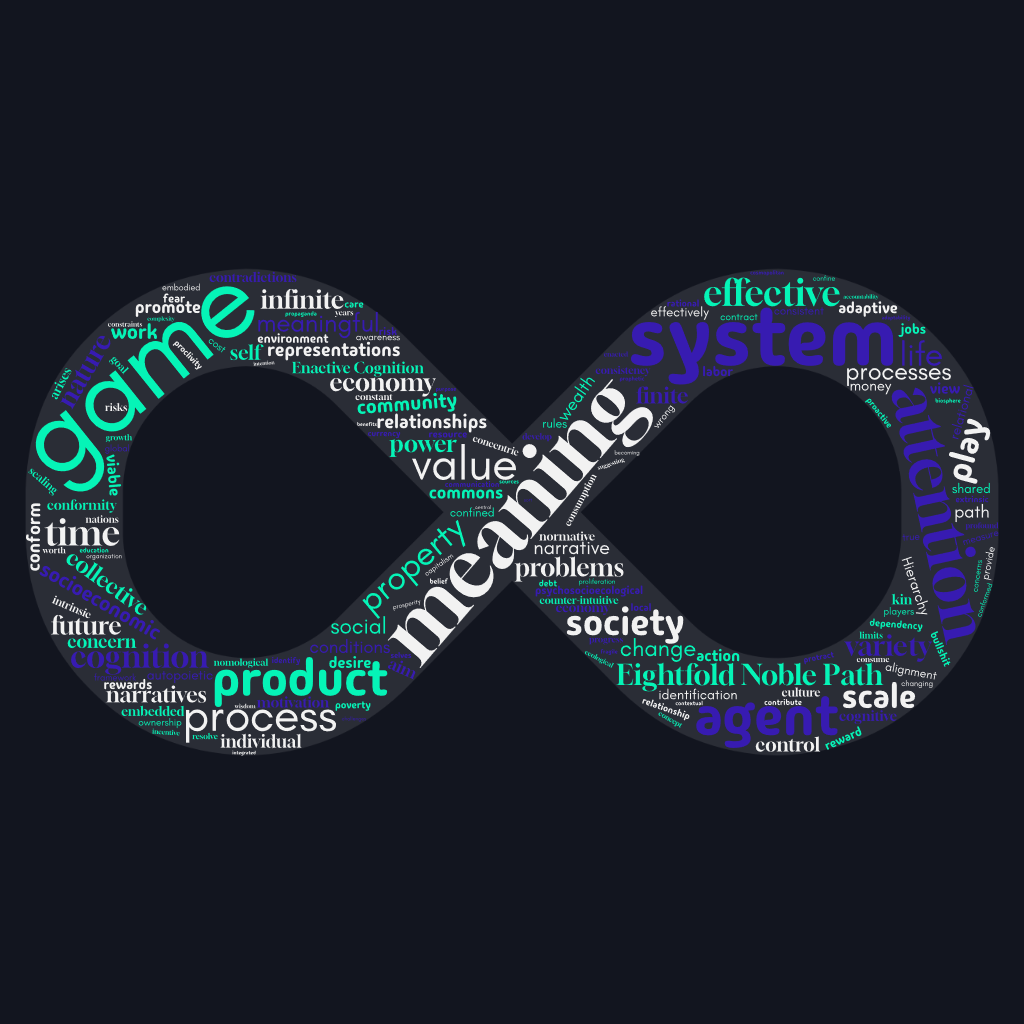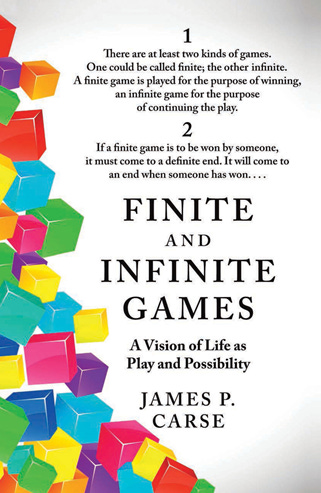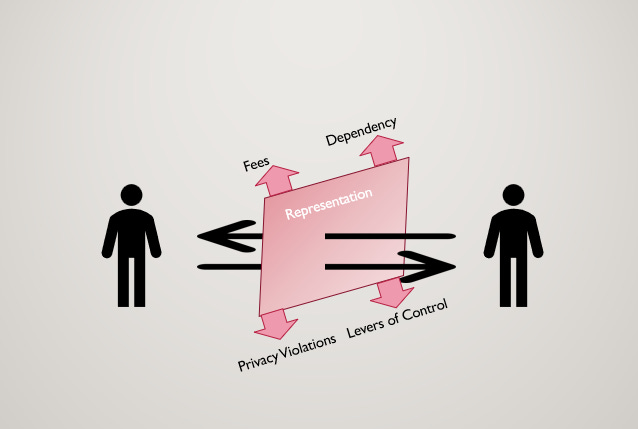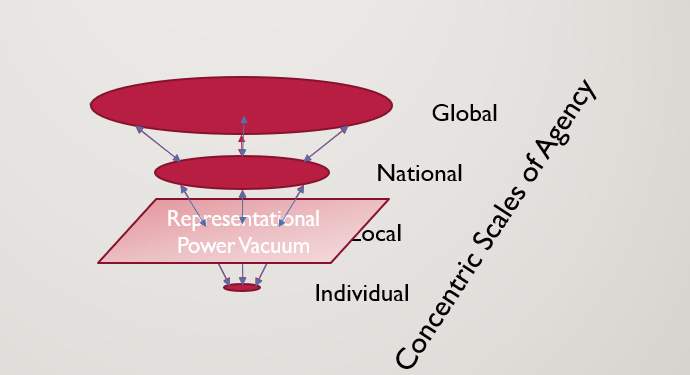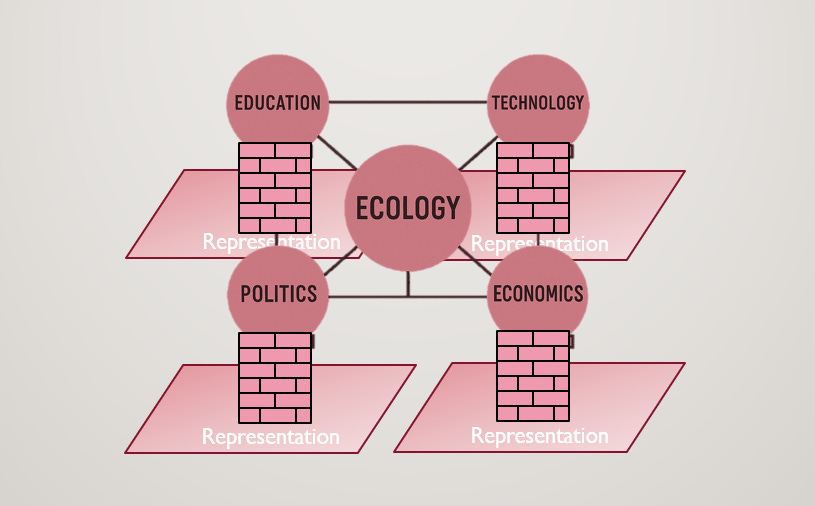Representation Vs. Reality. Why we need a Process Economy Now!
Hi friends, welcome as you Return to Process, this is a channel attempting to realize our Agency by applying Process Philosophy, Systems Theory, and Buddhism to the Meta Crisis.
I want to invite you to reflect on something truly meaningful in your life. Then ask yourself: what makes it so hard for us—as communities and societies—to organize around what really matters?
Historically, we turned to gods or religions to orient ourselves toward meaning. Today, our socioeconomic system functions as an ideological framework attempting to provide a narrative and pseudo-moral justification regarding what is worthy of our time and effort. It claims to know our collective desires and needs, and suggests how we should organize around them. It even goes so far as to claim that its system is neutral, but we will see the serious bias it has, and one I think Process Philosophy can speak to directly. Its bias is to products and representations, that is all it can measure, know, and control.
Therefore I propose a fundamental distinction between a Product Economy and a Process Economy. All socioeconomic systems we generally think of (capitalism, socialism, feudalism, and communism) are product economies. These require reified individuated selves trading products for the representation of value. So in this article, I want to dissect each one of these assumptions. If we understand an economy as simply the operating system that organizes the resources of our collective human system, then how do we organize around meaningful processes, in other words, what is a Process Economy?
What is a Process Economy?
We can think of this as very analogous to James Carse’s distinction between Finite and Infinite Games. Where finite games have rules, boundaries, value systems, teams, and an end to the game, and therefore a winner.
To the extent we treat society as a finite game, through warring nations, financialization of life-support systems, and multinational corporations trying to create monopolies, then society will end. Not only is it that the more we race to win, the faster it will end, but the more we all play by the same game, the larger the consequences of this end, as we are seeing with existential risks. We must orient to it as an infinite game, without teams, value systems, or rules, and to deeply realize what this entails, as the infinite game is not merely a chain of many finite games, as is often misinterpreted.
Axioms of a Product Economy
In my soon-to-be-published book, I tease apart many of these distinctions between the process and product economy. For example, an axiom of our socioeconomic system is property ownership. Putting aside that property without any relation doesn’t make sense from an ontological standpoint, as we can only truly use something. If we want to move the notion of property away from its product orientation, "of having lines drawn in the sand and your name on some paper," and towards a process orientation, it is about being in relationship with the people and land to steward a commons. This is one example of the kind of frame shift required here.
However, at the root of an economy is its value system. If our value system were neutral, we could say that value should be the representation of what we collectively find meaningful; therefore, value is a product of meaning, where meaning is only a process we engage with, as John Vervaeke describes. However, today we are seeing our value system as antithetical to meaning, it promotes and rewards exploitation of people and the planet, within a cycle of conspicuous consumption and bullshit jobs. Meanwhile, there's a lot of meaningful work that needs to be done (such as supporting psychological, sociological, and ecological wellbeing), and passionate people who want to engage in this but simply cannot be rewarded or supported. We cling to a monetary system as it seems to be the main incentive mechanism, yet it is deeply broken and cannot incentivize what is needed.
Partial Resolution to Goodhart's Law
Which brings us to Goodhart's law, which says, "When a measure becomes a target, it ceases to become a good measure.” This can play out in numerous ways, but here’s one example. There was a school in Israel whose parents were arriving late to pick up their children, so the school disincentivized this with a fee for every 15 minutes the parents were late. The parents then took that as the going rate for childcare and arrived even later. The school noticed the futility of this and then removed the fee; however, the parents continued arriving later. The monetary disincentive not only failed to work but also eroded the social norm of picking up one's child on time.
This is not an isolated case. The introduction of incentives often corrodes the relational fabric of communities. Incentives distort motivations, especially when used to replace trust, care, or responsibility. Therefore, whether due to Goodhart’s Law type mechanics or the nature of extrinsic rewards we are brought to a paradox, where we cannot use a metric to incentivize the meaningful work that needs to be done.
I suggest that the monetary system, being a tool of the product economy, is incompatible with the process economy.
So we encounter a serious incentive problem or paradox here. And just to keep this short, the partial resolution to this paradox is to have a dynamic and multivariate value system, where each metric can balance the biases of others. Somehow, we use money as a universal proxy to represent labor, energy, resources, time, data, and attention. We wouldn’t do this in any other field; in fact, in other fields, you often have multiple metrics to validate a single observation, not the other way around. After all, each of these things scales in different ways, gets created, transferred, and destroyed in different ways. So, whether or not we use this categorization for a multivariate value system, it’s clear that if we had a system whose metrics are more closely coupled to the real thing, it would prevent a lot of corruption, exploitation, and gross inequality from gaming the system.
This is not a Hyper-Representationalist approach
I have to be careful here because I don’t want to insist that we need more measurement. Firstly, we are already measuring these resource flows; it is just a matter of communicating and organizing around them. Secondly, I'm just taking the first crack at a middle way between product and process economy, and suggesting we shouldn’t organize ourselves, let alone trust, a single proxy that has already fallen prey to Goodhart’s law, as it has ceased to be a good measure. I bring this up because someone who is more product-oriented may address this problem of a misaligned value system by measuring more, as if a hyper-representationalist approach would get any closer to meaning. But we've seen this become increasingly invasive in our lives. It crosses into the mad and uncanny territory when we pair an attention economy with techniques to spy and invade privacy with a justification that we can measure, know, and provide for what people want. As if a last attempt to justify that a product economy can manage a society.
We have to recognize the distinction between a relational process and a representation or transaction. The extent that we mediate all relationships with transactions in this invasive way is to the extent that we become domesticated and lose all agency. As adding in a representational system as a middle-man between relations opens the flood-gates for fees, dependency, and privacy violations and implants unnecessary levers of control. In short, we use money to trust strangers however the more we depend on money the more strangers we create.
Individuated Self
This begins to address our last axiom of a product economy, the individuated self (don’t worry, we won’t answer the question of selfhood here), but the current system wants individuated selves to increase consumerism, dependency on the market, and to penetrate its representationalist framing between relations of all kinds. We've moved our basic needs to global supply chains because the relationships that constitute our life-support systems are then turned into transactions.
This, among many other dynamics, creates a power vacuum between the national and individual levels, where the agency of the locality or bioregion has largely been lost. Since the scale differential is too large, the individuated self is not in relation to the nation-state but remains transactional within representational government. However, the individual or nation cannot manage the local or global commons; it doesn’t fit within their framing of a finite game, and thus can only relate to it in extraction. Hence why I think it’s most important to realize the Process Economy at the Local and Global scales.
Meta Crisis
If we realize the implications of a process economy in all its instantiations, I believe it can address the meta-crisis. Teasing apart the economic mechanisms and relational dynamics can help shift our orientation towards a more symbiotic system. However, just like the meta-crisis, we often get overwhelmed and stuck, as it seems that every proposed solution is contingent upon some other system also being transformed at the same time. For example, how can we fix the educational system unless the economic or political system also goes through a profound transformation? Our system seems unable to adapt and has become rigid like a deer stuck in the headlights. I suggest adaptive agency is shifting or must shift to the local and global, which cannot be played as finite games.
It seems we are at the point where we need to question the nature of representations entirely. We put our faith in representations, thinking they are a stable footing, and then the rug gets pulled out from under our feet. I think this is the very nature of representations, that they appear stable until they collapse, whereas processes have a different kind of impermanence, one that doesn’t pretend to be a constant and reliable foundation.
So I'm not saying that we can or should replace the product economy with a process economy, or even that a process economy is necessarily a new thing. It is to acknowledge that it exists, and deeply come to recognize how parents among us, the poets, the pioneers, and practitioners are trying to organize around meaning. Our task is then to orient towards and support those engaging in a process economy and become supported by it. Just as duality is contained within non-duality, the process economy is not rejecting the product economy, but is a parallel system, a middle way through the meta-crisis. When the emissary fails, he comes to acknowledge the master.
The Prophetic Ability of Conveying Meaning
So this is all fine and well, but you still may ask “How?”, and where to even begin?
Each game has a story and narrative, some logic and game-mechanic that we can agree with, come to identify with, and explain to others. Our product economy, just like other ideological systems, paints a story for our future and such prophecies are grounded in and supported by belief systems.
If our task is to move beyond finite games, then how do we organize around the infinite game, what is the story and game logic that takes root in our minds. I can't simply tell you the new game mechanics, or a new story, I can't tell you rules or constraints to play the infinite game, I can't tell you what's valuable or how to win this game. But I can tell you how not to lose.
It is only through relations that we can viably organize within an infinite game. It is within a real community that we can convey what’s meaningful and trust in each other without reward mechanisms, stories, and representations. Practically speaking, this means building trust in a community that is oriented to co-create something important together, engaged in meaning-making, and developing relationships one can rely on. Through this, we gain the experiential knowledge of organizing as a collective and the wisdom that cannot be described in a rule book. If we do this at the local scale, the insights and practices may transcend the local to address our Global concerns.
When everything from jobs, government, economy, climate, and even information, truth, and identity are coming under question, and when we cannot find a secure footing in anything, that is when we should develop the tools to step off the rug before it is pulled from under us. Ultimately, to scale a process economy built on relations, not representations, we must understand what I'm framing as an Applied Enactive Theory of Collective Agency.
Enactive Theory of Collective Agency
To address questions of society is to recognize collective identity, and we can only scale our identity through relations. The western materialist "product-oriented view" fails to grok the emergence or causal power of the whole, as it only knows the parts. So when these parts or products scale, they scale quantitatively, they turn into clumps, but the conglomerations we are looking for, that constitute a society, are not a clump of people. I think it is only through a process-relational ontology that we can form wholes, as it is through relation that the contours of self expand.
I see agency as something that can perceive, understand, communicate, act, and basically walk the Noble Eight-Fold Path. I think the path, when viewed through the lens of collective enlightenment, can provide a process-oriented way to cultivate and realize what is meaningful. Especially in an otherwise unstable time. Therefore, I'm studying some relational processes involved in each step of the path that can generalize to all agents and help us organize viable collectives, but that’s a conversation for another time.

